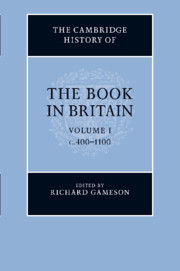Book contents
- Frontmatter
- 1 From Vindolanda to Domesday: the book in Britain from the Romans to the Normans
- PART I THE MAKING OF BOOKS
- PART II THE CIRCULATION OF BOOKS
- PART III TYPES OF BOOKS AND THEIR USES
- PART IV COLLECTIONS OF BOOKS
- 27 Patrick, apostle of the Irish
- 28 The library of Iona at the time of Adomnán
- 29 Literacy in Anglo-Saxon England
- 30 Aldhelm’s library
- 31 The library of the Venerable Bede
- 32 The library of Alcuin’s York
- 33 The library of Cynewulf
- 34 King Alfred and his circle
- 35 Ælfric’s library
- 36 The library of Byrhtferth
- 37 The library of Wulfstan of York
- 38 Rhygyfarch ap Sulien and Ieuan ap Sulien
- PART V CODA
- Bibliography
- Concordance of named manuscripts
- Index of manuscripts
- General Index
- Plate 4.1: The Lindisfarne Gospels"
- Plate 5.1: The Lichfield/St Chad Gospels"
33 - The library of Cynewulf
from PART IV - COLLECTIONS OF BOOKS
Published online by Cambridge University Press: 28 March 2012
- Frontmatter
- 1 From Vindolanda to Domesday: the book in Britain from the Romans to the Normans
- PART I THE MAKING OF BOOKS
- PART II THE CIRCULATION OF BOOKS
- PART III TYPES OF BOOKS AND THEIR USES
- PART IV COLLECTIONS OF BOOKS
- 27 Patrick, apostle of the Irish
- 28 The library of Iona at the time of Adomnán
- 29 Literacy in Anglo-Saxon England
- 30 Aldhelm’s library
- 31 The library of the Venerable Bede
- 32 The library of Alcuin’s York
- 33 The library of Cynewulf
- 34 King Alfred and his circle
- 35 Ælfric’s library
- 36 The library of Byrhtferth
- 37 The library of Wulfstan of York
- 38 Rhygyfarch ap Sulien and Ieuan ap Sulien
- PART V CODA
- Bibliography
- Concordance of named manuscripts
- Index of manuscripts
- General Index
- Plate 4.1: The Lindisfarne Gospels"
- Plate 5.1: The Lichfield/St Chad Gospels"
Summary
The singular circumstance of being able to give a name to the author of not one but four Anglo-Saxon works of literature has afforded the poet Cynewulf a significance arguably greater than the literary merits of his oeuvre warrant. Be that as it may, the four Old English poems bearing Cynewulf’s runic signature provide a unique opportunity to assess the reading of one named poet, based on a corpus of 2,600 lines and embracing the genres of ‘catalogue’, hagiography and epic. A name, however, is one thing; the issues of who that author might have been, and when and where he may have worked are quite different matters. Informed speculation on these questions – as well as on that of whether he composed works other than those in which his runic signature appears – has led to various conclusions. Currently the most widely held view is that he was an ecclesiastic, active in the early ninth century, and based in Mercia.
The single most important source detectable behind the oeuvre of Cynewulf is, unsurprisingly, the Bible, echoes of various parts of which are scattered throughout three of his four poems. If this was to be expected, it is nevertheless worth remarking that, in an era when the circulation of biblical books other than the gospels and the psalter was restricted, Cynewulf clearly knew and drew upon Job, Proverbs, Chronicles, Maccabees, and various of the prophets from the Old Testament, and upon Acts, the Pauline Epistles, the Letters of Peter and John, and the Apocalypse from the New. The obvious deduction is that he had access to a complete Bible or pandect.
Keywords
- Type
- Chapter
- Information
- The Cambridge History of the Book in Britain , pp. 665 - 669Publisher: Cambridge University PressPrint publication year: 2011
- 2
- Cited by

